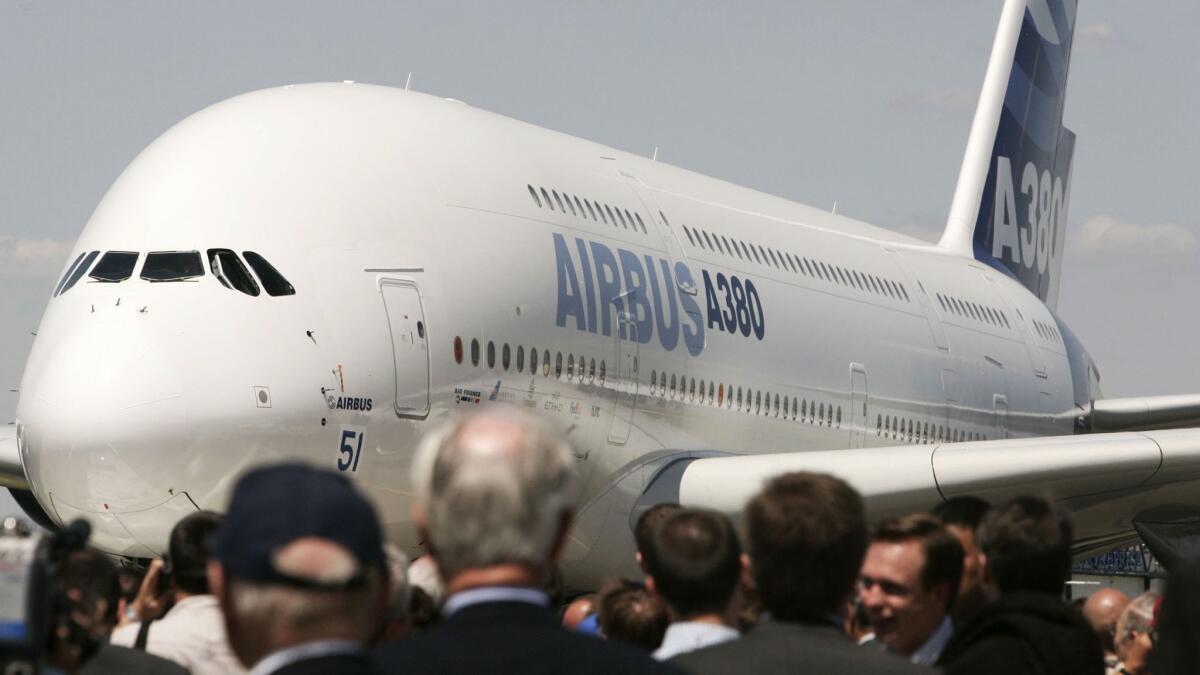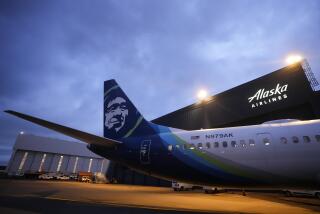U.S. threatens sanctions against Airbus after WTO rules Boeing was harmed by Europe’s subsidies

- Share via
The U.S. threatened to impose sanctions against the European Union after the World Trade Organization ruled that Airbus received illegal government funding to develop jetliners, costing Boeing Co. sales.
The final decision affirmed a 2016 finding that the EU had failed to eliminate unfair subsidies for two Airbus twin-aisle models, ending a long-running trade case. The international court is expected to rule later this year on a separate case in which the EU challenged billions of dollars in U.S. tax incentives to Boeing.
The litigation adds to the tension between the U.S. and Europe, two once-cooperative trade partners that are already sparring over U.S. President Trump’s steel and aluminum tariffs and his decision to back out of a nuclear treaty with Iran, jeopardizing $40 billion in aircraft sales.
The next stage of the 14-year battle decided Tuesday will be over the size of the tariffs the U.S. will be allowed to impose to compensate for lost exports. The Geneva-based WTO can’t force nations or companies to drop payments that violate trade rules, but it can authorize retaliatory measures to pressure governments into complying with its rulings.
The disputed funding to Airbus has cost U.S. aerospace manufacturers “tens of billions of dollars in lost sales,” U.S. Trade Representative Robert Lighthizer said in a statement. “Unless the EU finally takes action to stop breaking the rules and harming U.S. interests, the United States will have to move forward with countermeasures on EU products.”
The WTP decision affirmed a ruling that France, Germany, Spain and the U.K. have failed to adequately remedy market-distorting aid for the launch of Airbus’s A380 superjumbo, infrastructure support and equity investments that unfairly benefited the plane maker. The bloc compounded the issue with below-market loans for Airbus’ marquee A350 jetliner.
The financing hurt sales of Boeing’s 747 jumbo jetliner and 787 Dreamliner and clipped exports to the EU, Australia, China, South Korea, Singapore and the United Arab Emirates, the panel determined. The trade body also upheld an earlier finding that the EU aid had no adverse effect on the market for single-aisle jet sales, the largest source of profit for Boeing and Airbus.
The size of U.S. tariffs to be allowed will be determined through a WTO arbitration process, and will be based on the annual harm to the U.S. and Boeing — losses that the U.S. had previously pegged at $7 billion to $10 billion a year.
Airbus said it would take steps to ensure its aid complies with the decision, and predicted any eventual sanctions would be minor.
“Despite Boeing’s rhetoric, it is clear that their position today is straightforward healthy: They have half the market and a full order book, they have clearly not been damaged by Airbus repayable loans,” Airbus CEO Tom Enders said in a statement.
The U.S. and the EU have spent more than a decade wrangling over various government efforts to help Chicago-based Boeing and Toulouse, France-based Airbus defray billions of dollars in costs to design and produce commercial aircraft. Later this year, a separate WTO compliance panel is expected to deliver its decision on whether the U.S. complied with the terms of a 2012 ruling against illegal U.S. tax subsidies that gave Boeing an unfair advantage.
The trade court in September ruled in Boeing’s favor in another case brought by the EU, overturning an earlier finding that $8.7 billion in state aid to Boeing for making the 777X in Washington was a prohibited subsidy.
Shares of Airbus fell 0.9% to 96.25 euros in Paris. Boeing fell $2.47 to $342.12.
UPDATES:
3:45 p.m.: This article has been updated with Boeing’s closing stock price.
10:05 a.m.: This article has been updated with a statement by the U.S. Trade Representative.
This article was originally published at 9:55 a.m.
More to Read
Inside the business of entertainment
The Wide Shot brings you news, analysis and insights on everything from streaming wars to production — and what it all means for the future.
You may occasionally receive promotional content from the Los Angeles Times.










